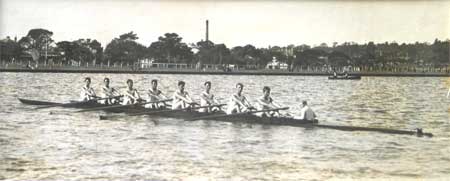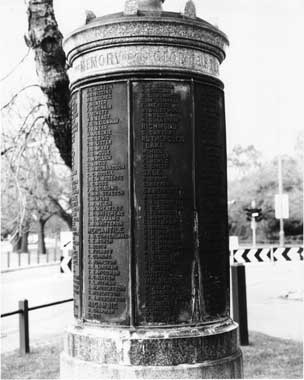History of Mercantile Rowing Club
Table of Contents
Chapters
- The River Yarra
- Early Rowing in Victoria
- The Beginnings (1880-1890)
- Mercantile in the Nineties (1890-1900)
- Sloan, Ivens and Fluctuating Fortunes (1900-1910)
- Dark Days and New Dawn (1910-1920)
- Years of Mixed Success (1920-1930)
- Through the Thirties (1930-1939)
- The Struggle for Survival (1939-1946)
- Building for Success (1946-1950)
- Mercantile to the Melbourne Olympics (1950-1956)
- Rowing to Rome (1956-1960)
- A Pink Cloud on the Horizon (1960-1965)
- The Storm and its Passing (1965-1966)
- A Clear Light Blue Sky (1966-1968)
- High Noon (1968-1970)
- A New Challenge (1970-1973)
- Fire and the Second Building Project (1973)
- Winds of Change (1973-1976)
- The Close of the Century (1976-1980)
- The Base for Success (1980-1984)
- Success (1984-1988)
- Oarsome Foursome (1988-1992)
- A Boathouse for the Best (1992-1996)
- The Rise of the Professional Coach (1996-2000)
- Golden Girls (2000-2005)
Appendices
6. Dark Days and New Dawn (1910-1920)
As a member of the British Empire, Australia was immediately involved but the battlefields of Europe were 12,000 miles away and surely a war of such magnitude could not last for long. Accordingly, for some months the Commonwealth went about its normal business. At the club's 1914 annual meeting the war rated only a brief mention and Mercantile together with the rest of the rowing community prepared for a normal season. There was no change in the club executive, with Cr. Stephen Morell entering his tenth year as president and Arch Dobbie being elected captain for the seventh time. Walter Joseph continued as secretary and Clive Hill was again treasurer, with J. E. Brown being vice-captain.
As usual, Henley was the opening regatta of the season and while the club did not have an entry in the Senior Eight, the winning Maiden Eight of the previous Upper Yarra and Albert Park Regattas had been kept together during the winter months and convincingly won their heat and final of the Junior Eight. With this crew Mercantile undoubtedly had the foundations of a new Senior Eight. It was difficult to conceive that over the next few years the majority of its members would be on active service and that, before the war had ended four years later, three of the crew would have been killed in action.

1914 Junior Eight at Henley on the Yarra
Bow: W Davey, 2: R Rush, 3: W Cumberland, 4: N Nation, 5: N Johnson, 6: F Wellings, 7: R Gregg, Str: J Mounsey. This was perhaps one of the unluckiest crews at Mercantile. Cumberland, Nation and Johnson were three of six Mercantilians who died in service of their nation in WWI.
Other club entries at this last Henley to be held for five years, were a Maiden Eight and Maiden Four. Both of these crews were unsuccessful, but having his first row for Mercantile in the seven seat of the Maiden Eight was Jim Sprigg, who had been elected as a member only 12 days earlier. Little did the meeting of the committee, held on October 12, 1914, realise that this new member would become one of the great captains of Mercantile, president of the club and a legend in his lifetime.
The usual programme of Championships and Regattas continued for the rest of the 1914-15 season, but the Interstate Eight and Sculls were abandoned for the duration of the war. Mercantile however, found it increasingly difficult to boat crews and did not compete in any of the Championships. The club managed representation in the majority of the regattas held, but no further wins were recorded.
Albert Park was successful in their seventh successive Champion Eight and also won the Champion Fours and the Senior Premiership. The Junior Premiership went to Footscray.
There was no doubt that for the 15 years up to the Great War, Albert Park had been the dominant club in Victorian senior rowing, despite spasmodic challenges from Ballarat and Mercantile, which each won premierships and a share of the various championships over the period. The Albert Park Club had been formed in 1872, eight years before Mercantile and, while it had won a Champion Eight as far back as 1889, its great run of success started during the late nineties, with a transfer to the club of Charles and Jim Donald from Wendouree and Alex Chamley from Yarra Yarra. From 1901-02 to 1914-15 Albert Park lost only two Senior Premierships and won 12 of the 16 Senior Eight Championships. They also won 10 Champion Fours, four Champion Pairs and three Champion Sculls. It was to be many years before Albert Park regained this strength of their great days up to 1915, but in the 1930's they were again a force in Victorian rowing.
As the 1914-15 season drew on, it became apparent that the war in Europe was not going to reach its anticipated quick conclusion and Australians began to flock to the enlistment offices. By the date of the 1915 annual meeting, 22 of the club's members of the previous season, or nearly 25% had "answered the Empire's call" and were either at the front or on active preparation with the military forces. Up to that time no casualties amongst the club's members had been reported, but on April 25, 1915, the unseasoned vanguard of the Australian Army had achieved immortality in the abortive landing at Gallipoli.
During the year the club was also saddened by the death of J. B. Whitty, who had been Mercantile's president from 1889 to 1903, and Cr. J. C. Dillon a vice-president of the club and who for many years had presented the trophies for a major Mercantile club race.
Prior to the 1915-16 season, all recognised regattas had been abandoned for the duration of the war and inter-club rowing was confined to a series of challenge races between various clubs, together with a few combination races. It was not found practicable to hold the usual club races and all social events had also been abandoned.
With enlistments totalling 37 paying members of the club in all categories had been reduced to 63. The consequent decline in revenue required stringent economics to maintain the club's solvency and it was a tribute to the executive that the season finished with a surplus of some £40.
As yet the club had not suffered any fatal casualties among its members in the forces, but Private Len Butler, who had been a member of the successful Maiden Eight at the Footscray Regatta of 1908 had been permanently disabled, while Lieut. A. T. Harvey, who had represented the club in the Interstate Eight in 1914 also had been seriously wounded.
Throughout the war years Mercantile was extremely fortunate in that it was necessary to make only a few changes in its executive. Cr. Stephen Morell remained the club's president, with Arch Dobbie as captain and Walter Joseph its secretary. In 1916-17 Ted Kenny entered his second year as vice-captain and Alec Clarke took over from Clive Hill as treasurer. This latter appointment was of particular significance, as Alec Clarke was to remain treasurer for more than 30 years and guide the club's finances through the rest of the 1914-18 war, the Great Depression of the Thirties and yet another World War. His great charm and "painless extraction" of outstanding subscriptions, on a time payment basis, contributed greatly to the future stability of Mercantile and endeared him to all members.
Again there was no regatta racing during the 1916-17 season with competitive rowing being confined to a series of Combination Races conducted by the V.R.A. and various clubs. The highlight of these continued to be the Morell Eights which attracted an entry of 17 crews.
By the end of the year Mercantile members who had joined the forces numbered 41, with three of these having made the supreme sacrifice. There was a further decline in subscription paying members and the number of full members had reduced to 31, in addition there were 14 honorary members. In an attempt to alleviate the situation a new and temporary form of junior membership was introduced for the 1916-17 season, with this being confined to persons under 25 years of age. Subscription for this class of membership which was available for one year only, was 12/6 and succeeded in attracting eight new entrants for a total of £5.
A further crisis during the year was a demand from the Alexandra Park Trust from whom the ground lease of the clubhouse was held, to repaint and renovate the club's premises. In view of the circumstances of the time it was deemed impracticable to carry out this work with club labour, and an outside contractor was employed at a cost of £40. This unexpected expense was more than covered by donations from a number of members and the club was still able to finish the year with a surplus of £30.
As the war dragged on in Europe, Victorian rowing continued on its severely restricted format during 1917-18. Combination races and a few Challenge Races remained the only form of competitive rowing with the Morell Eights still managing to attract an entry of 120 oarsmen.
Further enlistments had taken place during the year and Captain N. L. Johnson and Lieut. N. Nation, who had both been members of the winning Junior Eight at the Henley Regatta of 1914, were killed in action. Several other members were reported as having been wounded.
Due to the efforts of several older members, the club had been successful in recruiting a number of new members, which had partially offset enlistments and resignations. This membership drive was greatly assisted by the permanent introduction of junior membership, with a new age limit of 21 years, and a subscription of £1.3.6 which was applicable only during the first year of membership.
Thanks to these recruiting efforts and generous donations on the part of a number of members of the club, the club again finished the year with a surplus and a healthy bank balance of £104.
With the signing of the Armistice on November 11, 1918, rowing and the club, together with the rest of the combatants, stopped to count the cost of the greatest conflict the world had then known. John Lang's "Victorian Oarsmen and Rowing Register", published in 1919, advises that 1,380 Victorian oarsmen joined the forces, with 263 of these enlistments failing to return. There is, of course, no record of the premature death in the years that followed as a result of wounds or the effect of gas, which had been used so freely on the Western Front. The Mercantile Honour Roll shows that 43 of its members enlisted, of whom six were killed. Six club members were decorated. A further 25 former members had joined the forces, with seven of these being killed in action.
As the troops returned from the battlefields of Europe, the community gradually began to pick up the threads of its normal life, fortunately without the knowledge that within 21 years the world would be involved in even greater hostilities.
In the closing stages of the war, the club had invested £100 in the Commonwealth War Loan and subsequently, Mercantile members contributed generously to the Fallen Oarsmen's Memorial Fund. The proceeds of this fund were applied towards the cost of a Memorial located on the lawn at the intersection of Jeffries Parade and Alexandra Avenue and it is an unfortunate fact of life that very few present-day oarsmen are aware of its existence.

The cenotaph at the corner of Boathouse Drive and Alexander Avenue errected by the Victorian Rowing Association in memory of members of the Association killed in the 1914-18 war.
